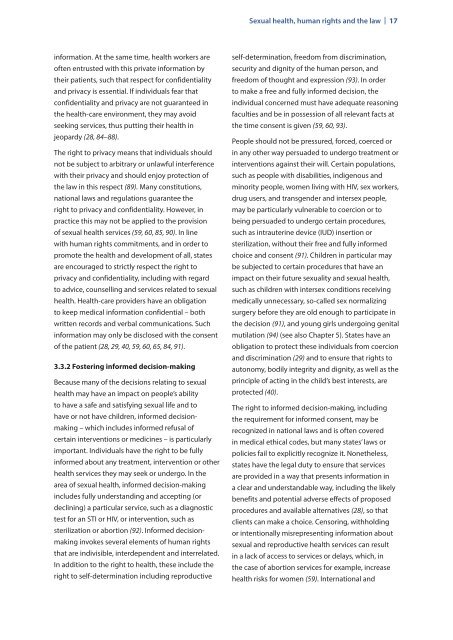Sexual health human rights and the law
1XoaDvM
1XoaDvM
Create successful ePaper yourself
Turn your PDF publications into a flip-book with our unique Google optimized e-Paper software.
<strong>Sexual</strong> <strong>health</strong>, <strong>human</strong> <strong>rights</strong> <strong>and</strong> <strong>the</strong> <strong>law</strong> | 17<br />
information. At <strong>the</strong> same time, <strong>health</strong> workers are<br />
often entrusted with this private information by<br />
<strong>the</strong>ir patients, such that respect for confidentiality<br />
<strong>and</strong> privacy is essential. If individuals fear that<br />
confidentiality <strong>and</strong> privacy are not guaranteed in<br />
<strong>the</strong> <strong>health</strong>-care environment, <strong>the</strong>y may avoid<br />
seeking services, thus putting <strong>the</strong>ir <strong>health</strong> in<br />
jeopardy (28, 84–88).<br />
The right to privacy means that individuals should<br />
not be subject to arbitrary or un<strong>law</strong>ful interference<br />
with <strong>the</strong>ir privacy <strong>and</strong> should enjoy protection of<br />
<strong>the</strong> <strong>law</strong> in this respect (89). Many constitutions,<br />
national <strong>law</strong>s <strong>and</strong> regulations guarantee <strong>the</strong><br />
right to privacy <strong>and</strong> confidentiality. However, in<br />
practice this may not be applied to <strong>the</strong> provision<br />
of sexual <strong>health</strong> services (59, 60, 85, 90). In line<br />
with <strong>human</strong> <strong>rights</strong> commitments, <strong>and</strong> in order to<br />
promote <strong>the</strong> <strong>health</strong> <strong>and</strong> development of all, states<br />
are encouraged to strictly respect <strong>the</strong> right to<br />
privacy <strong>and</strong> confidentiality, including with regard<br />
to advice, counselling <strong>and</strong> services related to sexual<br />
<strong>health</strong>. Health-care providers have an obligation<br />
to keep medical information confidential – both<br />
written records <strong>and</strong> verbal communications. Such<br />
information may only be disclosed with <strong>the</strong> consent<br />
of <strong>the</strong> patient (28, 29, 40, 59, 60, 65, 84, 91).<br />
3.3.2 Fostering informed decision-making<br />
Because many of <strong>the</strong> decisions relating to sexual<br />
<strong>health</strong> may have an impact on people’s ability<br />
to have a safe <strong>and</strong> satisfying sexual life <strong>and</strong> to<br />
have or not have children, informed decisionmaking<br />
– which includes informed refusal of<br />
certain interventions or medicines – is particularly<br />
important. Individuals have <strong>the</strong> right to be fully<br />
informed about any treatment, intervention or o<strong>the</strong>r<br />
<strong>health</strong> services <strong>the</strong>y may seek or undergo. In <strong>the</strong><br />
area of sexual <strong>health</strong>, informed decision-making<br />
includes fully underst<strong>and</strong>ing <strong>and</strong> accepting (or<br />
declining) a particular service, such as a diagnostic<br />
test for an STI or HIV, or intervention, such as<br />
sterilization or abortion (92). Informed decisionmaking<br />
invokes several elements of <strong>human</strong> <strong>rights</strong><br />
that are indivisible, interdependent <strong>and</strong> interrelated.<br />
In addition to <strong>the</strong> right to <strong>health</strong>, <strong>the</strong>se include <strong>the</strong><br />
right to self-determination including reproductive<br />
self-determination, freedom from discrimination,<br />
security <strong>and</strong> dignity of <strong>the</strong> <strong>human</strong> person, <strong>and</strong><br />
freedom of thought <strong>and</strong> expression (93). In order<br />
to make a free <strong>and</strong> fully informed decision, <strong>the</strong><br />
individual concerned must have adequate reasoning<br />
faculties <strong>and</strong> be in possession of all relevant facts at<br />
<strong>the</strong> time consent is given (59, 60, 93).<br />
People should not be pressured, forced, coerced or<br />
in any o<strong>the</strong>r way persuaded to undergo treatment or<br />
interventions against <strong>the</strong>ir will. Certain populations,<br />
such as people with disabilities, indigenous <strong>and</strong><br />
minority people, women living with HIV, sex workers,<br />
drug users, <strong>and</strong> transgender <strong>and</strong> intersex people,<br />
may be particularly vulnerable to coercion or to<br />
being persuaded to undergo certain procedures,<br />
such as intrauterine device (IUD) insertion or<br />
sterilization, without <strong>the</strong>ir free <strong>and</strong> fully informed<br />
choice <strong>and</strong> consent (91). Children in particular may<br />
be subjected to certain procedures that have an<br />
impact on <strong>the</strong>ir future sexuality <strong>and</strong> sexual <strong>health</strong>,<br />
such as children with intersex conditions receiving<br />
medically unnecessary, so-called sex normalizing<br />
surgery before <strong>the</strong>y are old enough to participate in<br />
<strong>the</strong> decision (91), <strong>and</strong> young girls undergoing genital<br />
mutilation (94) (see also Chapter 5). States have an<br />
obligation to protect <strong>the</strong>se individuals from coercion<br />
<strong>and</strong> discrimination (29) <strong>and</strong> to ensure that <strong>rights</strong> to<br />
autonomy, bodily integrity <strong>and</strong> dignity, as well as <strong>the</strong><br />
principle of acting in <strong>the</strong> child’s best interests, are<br />
protected (40).<br />
The right to informed decision-making, including<br />
<strong>the</strong> requirement for informed consent, may be<br />
recognized in national <strong>law</strong>s <strong>and</strong> is often covered<br />
in medical ethical codes, but many states’ <strong>law</strong>s or<br />
policies fail to explicitly recognize it. None<strong>the</strong>less,<br />
states have <strong>the</strong> legal duty to ensure that services<br />
are provided in a way that presents information in<br />
a clear <strong>and</strong> underst<strong>and</strong>able way, including <strong>the</strong> likely<br />
benefits <strong>and</strong> potential adverse effects of proposed<br />
procedures <strong>and</strong> available alternatives (28), so that<br />
clients can make a choice. Censoring, withholding<br />
or intentionally misrepresenting information about<br />
sexual <strong>and</strong> reproductive <strong>health</strong> services can result<br />
in a lack of access to services or delays, which, in<br />
<strong>the</strong> case of abortion services for example, increase<br />
<strong>health</strong> risks for women (59). International <strong>and</strong>


